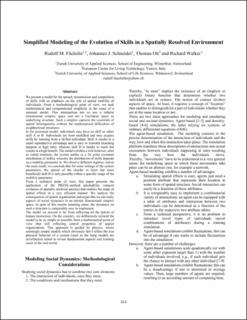Bitte benutzen Sie diese Kennung, um auf die Ressource zu verweisen:
https://doi.org/10.21256/zhaw-17919| Publikationstyp: | Konferenz: Paper |
| Art der Begutachtung: | Peer review (Publikation) |
| Titel: | Simplified modeling of the evolution of skills in a spatially resolved environment |
| Autor/-in: | Füchslin, Rudolf Marcel Schneider, Johannes Josef Ott, Thomas Walker, Richard |
| et. al: | No |
| DOI: | 10.1162/isal_a_00182 10.21256/zhaw-17919 |
| Tagungsband: | Proceedings of the Artificial Life Conference 2019 |
| Herausgeber/-in des übergeordneten Werkes: | Fellermann, Harold Bacardit, Jaume Goñi-Moreno, Angel Füchslin, Rudolf Marcel |
| Seite(n): | 324 |
| Seiten bis: | 330 |
| Angaben zur Konferenz: | International Conference on Artificial Life (ALIFE), Newcastle, United Kingdom, 29 July - 2 August 2019 |
| Erscheinungsdatum: | Jul-2019 |
| Verlag / Hrsg. Institution: | Massachusetts Institute of Technology |
| ISBN: | 978-0-262-35844-6 |
| Sprache: | Englisch |
| Schlagwörter: | Artificial life; Social modeling; Complex systems; Modeling in anthropology |
| Fachgebiet (DDC): | 003: Systeme |
| Zusammenfassung: | We present a model for the spread, transmission and competition of skills with an emphasis on the role of spatial mobility of individuals. From a methodological point of view, we seek mathematical and computational simplicity in the sense of a minimal model. This minimalism lets us use a infinite dimensional simplex space and not a Euclidean space as underlying structure. Such a simplex captures the essentials of spatial heterogeneity without the mathematical difficulties of neighborhood structures. In the presented model, individuals may have no skill or either skill A or B. Individuals are born unskilled and may acquire skills by learning from a skilled individual. Skill A results in a small reproductive advantage and is easy to transmit (teaching happens at high rate), whereas skill B is harder to teach but results in a high benefit. The model exhibits a rich behavior; after an initial transient, the system settles to a fix point (constant distribution of skills), whereby the distribution of skills depends on a mobility parameter m. We observe different regimes, and as the main result, we conclude that for some settings of the system parameters, the spread of the (harder to learn but more beneficial) skill B is only possible within a specific range of the mobility parameter. From a technical point of view, this paper presents the application of the PRESS–method (probability reduced evolution of spatially resolved species) that enables the study of spatial effects in a very efficient manner. We analyze the consequences of spatial organization and argue that we can study aspects of social dynamics in an infinite dimensional simplex space. In spite of this maybe daunting name, the dynamics on such a structure is comparably easy to implement. The model we present is far from reflecting all the details of human interaction. On the contrary, we deliberately tailored the model to be as simple as possible from a mathematical point of view (but still reflecting central properties of spatial organization). This approach is guided by physics, where seemingly simple models which obviously don’t reflect the true physical behavior of a system (such as the Ising model) are nevertheless suited to reveal fundamental aspects and limiting cases of the real world. |
| URI: | https://digitalcollection.zhaw.ch/handle/11475/17919 |
| Volltext Version: | Publizierte Version |
| Lizenz (gemäss Verlagsvertrag): | CC BY 4.0: Namensnennung 4.0 International |
| Departement: | Life Sciences und Facility Management School of Engineering |
| Organisationseinheit: | Institut für Angewandte Mathematik und Physik (IAMP) Institut für Computational Life Sciences (ICLS) |
| Enthalten in den Sammlungen: | Publikationen School of Engineering |
Dateien zu dieser Ressource:
| Datei | Beschreibung | Größe | Format | |
|---|---|---|---|---|
| ALIFE_2019_FüchslinSchneiderOttWalker.pdf | 425.36 kB | Adobe PDF |  Öffnen/Anzeigen |
Zur Langanzeige
Füchslin, R. M., Schneider, J. J., Ott, T., & Walker, R. (2019). Simplified modeling of the evolution of skills in a spatially resolved environment [Conference paper]. In H. Fellermann, J. Bacardit, A. Goñi-Moreno, & R. M. Füchslin (Eds.), Proceedings of the Artificial Life Conference 2019 (pp. 324–330). Massachusetts Institute of Technology. https://doi.org/10.1162/isal_a_00182
Füchslin, R.M. et al. (2019) ‘Simplified modeling of the evolution of skills in a spatially resolved environment’, in H. Fellermann et al. (eds) Proceedings of the Artificial Life Conference 2019. Massachusetts Institute of Technology, pp. 324–330. Available at: https://doi.org/10.1162/isal_a_00182.
R. M. Füchslin, J. J. Schneider, T. Ott, and R. Walker, “Simplified modeling of the evolution of skills in a spatially resolved environment,” in Proceedings of the Artificial Life Conference 2019, Jul. 2019, pp. 324–330. doi: 10.1162/isal_a_00182.
FÜCHSLIN, Rudolf Marcel, Johannes Josef SCHNEIDER, Thomas OTT und Richard WALKER, 2019. Simplified modeling of the evolution of skills in a spatially resolved environment. In: Harold FELLERMANN, Jaume BACARDIT, Angel GOÑI-MORENO und Rudolf Marcel FÜCHSLIN (Hrsg.), Proceedings of the Artificial Life Conference 2019. Conference paper. Massachusetts Institute of Technology. Juli 2019. S. 324–330. ISBN 978-0-262-35844-6
Füchslin, Rudolf Marcel, Johannes Josef Schneider, Thomas Ott, and Richard Walker. 2019. “Simplified Modeling of the Evolution of Skills in a Spatially Resolved Environment.” Conference paper. In Proceedings of the Artificial Life Conference 2019, edited by Harold Fellermann, Jaume Bacardit, Angel Goñi-Moreno, and Rudolf Marcel Füchslin, 324–30. Massachusetts Institute of Technology. https://doi.org/10.1162/isal_a_00182.
Füchslin, Rudolf Marcel, et al. “Simplified Modeling of the Evolution of Skills in a Spatially Resolved Environment.” Proceedings of the Artificial Life Conference 2019, edited by Harold Fellermann et al., Massachusetts Institute of Technology, 2019, pp. 324–30, https://doi.org/10.1162/isal_a_00182.
Alle Ressourcen in diesem Repository sind urheberrechtlich geschützt, soweit nicht anderweitig angezeigt.